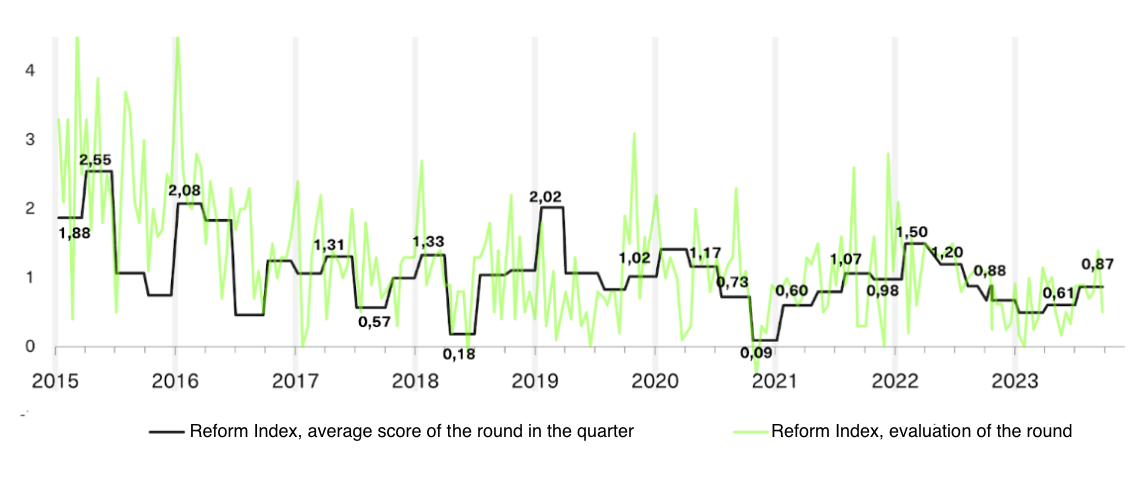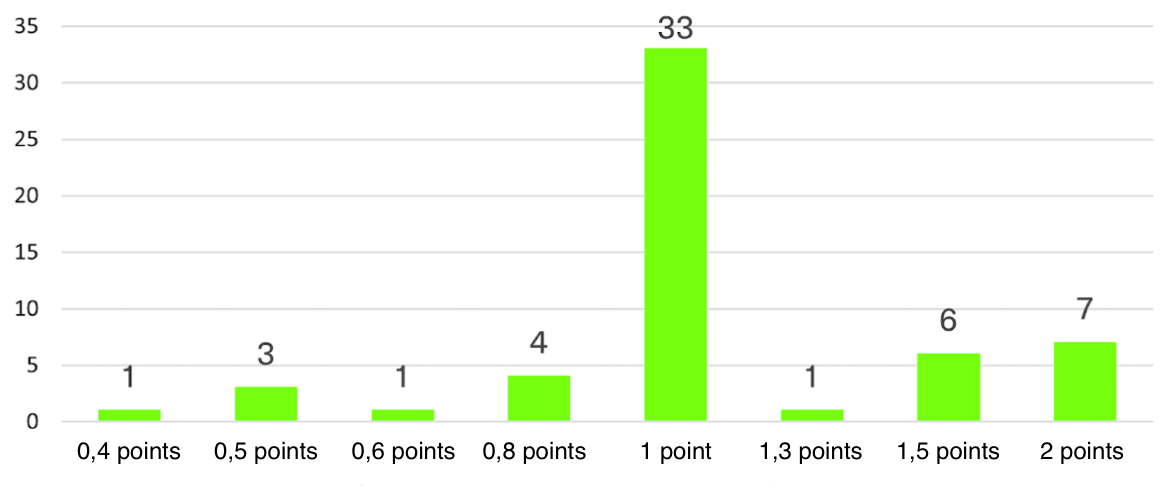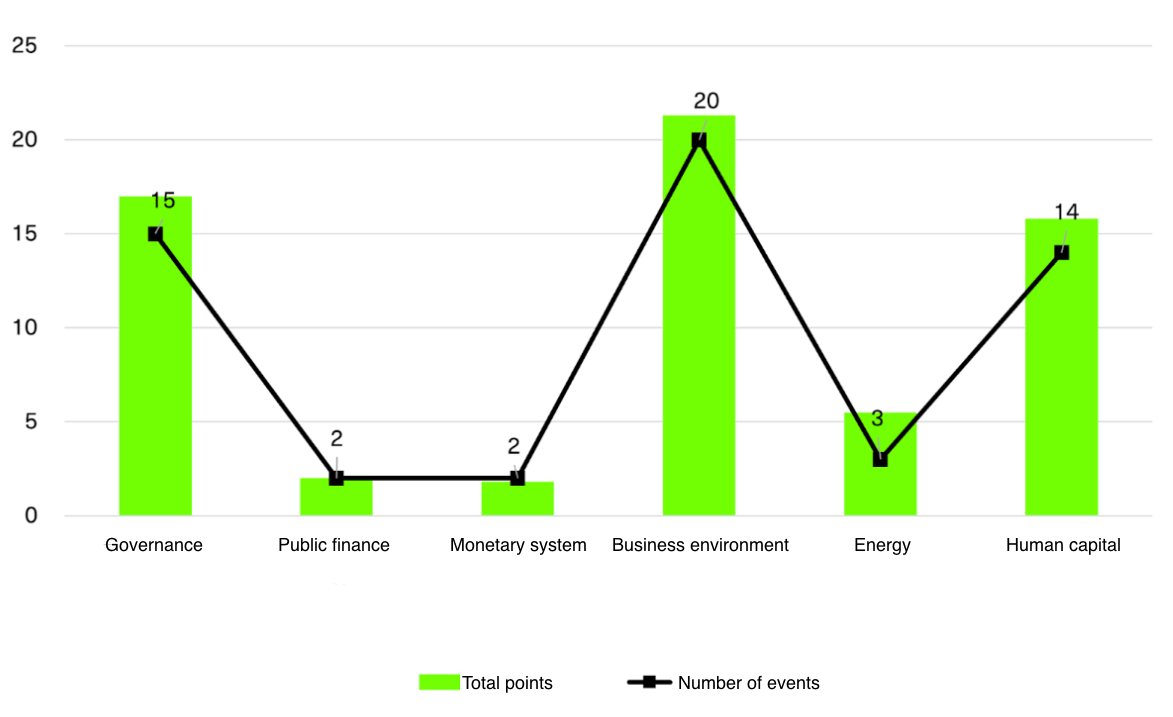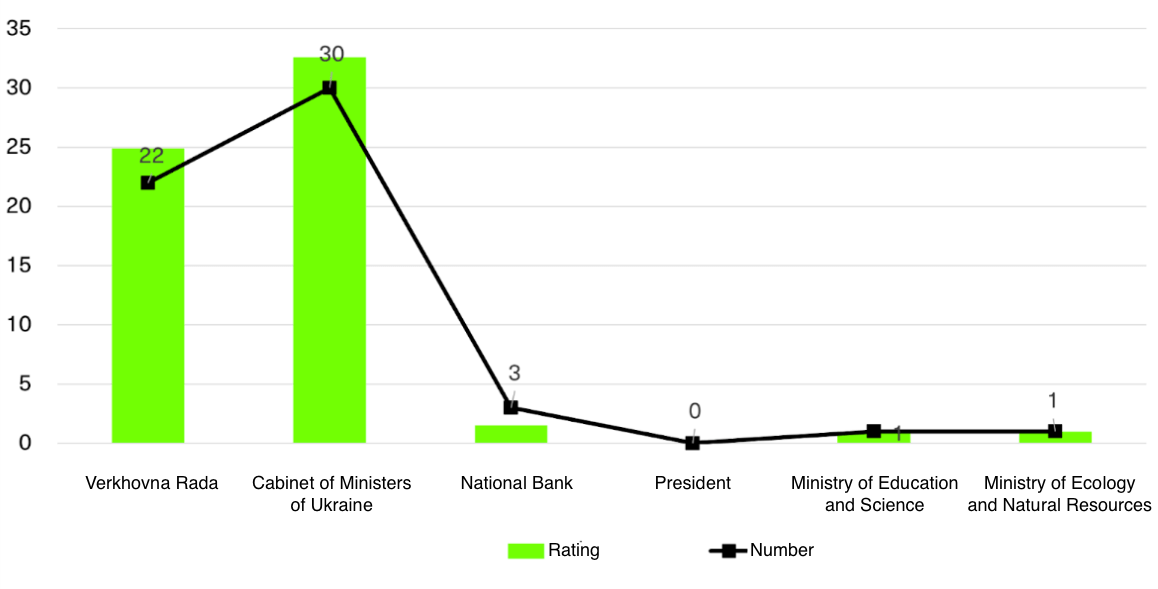By the end of the year, Ukraine has nearly completed the fulfillment of seven European Union requirements to begin accession negotiations. Ukraine made progress in judicial reform and continued harmonizing its national legislation with European standards.
No reform in the third quarter was able to surpass the +2 score threshold that distinguishes important reforms from less significant ones. However, there is good news: during this period (as in the previous two quarters), no anti-reform regulations were observed. There were also no questionable regulations with an overall “zero” rating.
Figure 1. Reform Index’s quarterly average
Source: Reform Index’s issues 216-221
The highest rating of +2 (on a scale ranging from -5 to +5) was awarded to the seven new regulations reviewed below, which pertain to healthcare, energy, environmental protection, border crossing, and state property management.
Healthcare remained a focal point of government attention.
The telemedicine law (Reform Index 220) brings the remote provision of medical or rehabilitation services (online consultations with doctors, online medical counseling) into the legal field. The document not only defines key concepts in the field of telemedicine but also establishes conditions for providing such services. All healthcare institutions and private practitioners with a license to practice medicine will be able to offer online treatment. Implementing clear “rules of the game” in telemedicine is expected to promote the development of medical online services and improve citizens’ overall access to healthcare services, making it more convenient for them to receive healthcare.
The resolution on the licensing system for healthcare institutions providing rehabilitation services (Reform Index 220) obliges them to use only evidence-based methods in their practice. It introduces new requirements for the work of multidisciplinary rehabilitation teams, which include healthcare professionals from various fields (psychologists, physical and occupational therapists, prosthetists, etc.). Now, only psychologists and psychotherapists who have received medical education in these specialties, have at least one year of experience, and meet the unified qualification requirements of the Ministry of Health can work in these teams. Healthcare institutions are also required to develop and approve individual rehabilitation plans for patients, monitor and evaluate the implementation of these plans, and make adjustments as needed. These changes aim to reduce the risk of patients losing functionality and prevent using outdated or ineffective rehabilitation methods.
The Verkhovna Rada also adopted important laws in the energy sector.
The law on preventing abuse in energy markets (Reform Index 216) introduces provisions from the EU Regulation on Wholesale Energy Market Integrity and Transparency (REMIT). The document strengthens oversight by the National Commission for Energy and Utilities Regulation (NСEUR), empowering it to monitor and investigate abuses in energy markets, as well as to determine what specific behavior constitutes a violation or manipulation. The law also establishes rules of conduct regarding insider information in the energy market, prohibiting its disclosure or use for trading purposes. According to the law, a register of market participants must be created in Ukraine, and tools for reporting suspicious transactions should be implemented.
The law on corporate governance reform of the “Gas Transmission System Operator of Ukraine” (GTSOU, Reform Index 220) is essential for complying with the memorandum with the International Monetary Fund (IMF). It entails transferring GTSOU from the Ministry of Finance to the Ministry of Energy and implementing quality corporate governance within the company. GTSOU will receive its own supervisory board and a new charter that complies with the rules of the international organization in the energy market sector, the Energy Community Secretariat.
The government has shown progress in adopting sectoral reforms.
The new rules for the protection of underground waters (Reform Index 218) establish requirements for drilling and using wells and obligate water users to provide reports to the State Register of Artesian Wells. Additionally, wells must be constructed in a way that allows for all necessary measurements and water sampling and enables repair and restoration work. These rules apply to companies engaged in geological exploration, extracting underground waters, or any activities that may have a negative impact on the state of these waters.
The law on harmonizing procedures for declaring military equipment and oil products with NATO and EU standards (Reform Index 221) introduces changes to the Customs Code and other laws of Ukraine. Importers are now required to provide customs officials with documents from the manufacturer confirming the characteristics of the goods, as well as the supply route of the goods from the manufacturer to the enterprise. Additionally, importers of oil products must provide the Energy Customs of Ukraine with a package of documents confirming the supply chain of oil products from the manufacturing plant to the Ukrainian border. While these changes create additional work for importers, their purpose is to prevent the import of counterfeit products into Ukraine and to trace the origin of oil products, particularly those originating from Russia.
According to the new rules for the sale and lease of assets of state-owned joint-stock companies (Reform Index 221), such enterprises will be able to sell and lease their property exclusively online through ProZorro.Sale. These auctions can be both ascending and descending. Anyone can participate in them, including foreigners (except citizens of Russia). At the same time, all lease agreements concluded earlier will remain in force until the end of their term.
Figure 2. Number of regulations with a specific score, 3rd quarter of 2023
Source: Reform Index’s issues 216-221
Reform Progress in the Reform Index’s areas
The Reform Index tracks regulatory changes across six areas: governance, public finance, monetary system, business environment, energy, and human capital. In the third quarter, the most significant advancements were made in “Business Environment,” “Governance,” and “Human Capital.” Let us discuss them in more detail.
Figure 3. Total event scores by area, 3rd quarter of 2023
Source: Reform Index’s issues 216-221
Business environment
Over the course of three months, we have recorded 20 significant changes in this area. Nine of them were initiated by the Cabinet of Ministers, nine by the Verkhovna Rada, and one by the Ministry of Environmental Protection and Natural Resources. Two events in this category received a score of +2, which includes the changes to the Customs Code we discussed earlier and the law on protecting underground waters. Let us now discuss the rest of the changes.
Consumer Markets. The Verkhovna Rada has passed an updated law that harmonizes the Ukrainian consumer protection system with the European one (Reform Index 216). The law defines concepts in the field of e-commerce and obliges trading platforms to disclose information about sellers who use their services. In the event of violations, the State Service on Food Safety and Consumer Protection may require the internet service provider to restrict access to dishonest marketplaces.
The law on food safety and animal husbandry development (Reform Index 217) introduces international standards for defining natural food products and those suitable for vegans or vegetarians. The law includes provisions for creating a state register of food additives, food Flavorings, and food enzymes, as well as a state register of novel food products and a state register of health claims, which will contain information about the positive impact of certain food products or their components on consumers’ health.
The law on legalizing craft alcoholic beverages (Reform Index 219) defines who can be a small producer of distillates (food spirits) and specifies the equipment such producers can use. The law also allows craft alcohol producers to report their production and sales volumes quarterly (the old legislation required monthly reporting). It also reduces fines for non-submission or improper submission of reports from UAH 17,500 to UAH 1,020. Another law (Reform Index 220) simplifies certification for small wine producers who manufacture up to 100,000 liters of wine annually from Ukrainian raw materials. They now only need to submit an application for a license and a receipt for its payment. Mandatory licensing for retail and wholesale trade has also been abolished for small producers, and reporting will be annual instead of monthly.
In the third quarter, Parliament adopted a European integration law on state control over products containing genetically modified organisms (GMOs, Reform Index 221). Such products must be labeled as “with GMOs” or “without GMOs” to allow consumers to make informed choices when purchasing them. Additionally, they should be transported in a way that prevents them from entering the environment. The law will come into effect in three years, during which all GMO products that are not registered or produced illegally in Ukraine should be removed from circulation. During this time, a register of GMO products should also be established.
Environmental protection. According to changes to the Environmental Impact Assessment (EIA) law (Reform Index 217), consultations on environmental impact reports should involve not only the public but also local self-government bodies. Additionally, the deadlines for public discussions of these reports have been shortened (previously, the entire process took up to 53 working days; now it takes up to 28), and they can be conducted via video conferencing if there are fewer than ten registered participants. Martial law exempts restorative work related to eliminating the consequences of armed aggression by Russia from environmental impact assessments. Communities under occupation or in active combat zones are also exempt from conducting such assessments.
The Cabinet of Ministers made an important decision as part of waste management reform. They approved new criteria for ceasing waste status for remaining raw materials that can be reused (Reform Index 218). These changes are expected to increase the volume of waste recycling instead of accumulating it in landfills.
Ukraine also ratified the international Agreement on Fisheries Subsidies within the framework of the World Trade Organization (WTO, Reform Index 219). Under this document, Ukraine committed not to provide subsidies to unreported and unregulated fishing businesses.
Medical business. The Cabinet of Ministers has prohibited pharmacies from including information about price advantages on their signboards for advertisement (Reform Index 216). Expressions such as “low prices,” “wholesale prices,” “social,” “affordable,” and the like are prohibited. Pharmacies are also not allowed to indicate that they cater to a specific social group or compare themselves to others, as such actions can mislead consumers and hinder informed choice of a specific establishment. However, the government has allowed pharmacies to establish mobile pharmacy points (Reform Index 218), which can serve rural areas with no stationary pharmacies and, during wartime, on frontline territories. Pharmacies will have the flexibility to determine the assortment of their mobile points and can dispense reimbursable medicines and prescription drugs based on paper or electronic prescriptions.
Virtual assets. In the third quarter, the Verkhovna Rada adopted two laws that regulate the use of virtual assets and digital content. The first law, “On Digital Content and Digital Services” (Reform Index 220), harmonizes Ukrainian legislation with European standards and places the provision of digital services and digital content within the scope of civil legal relations. It defines key concepts in the field of digital services, sets criteria for fulfilling contracts for such services, and outlines responsibilities for violations. The second law (Reform Index 220) categorizes virtual assets and digital content as objects of civil rights, subject to the norms of the Civil Code of Ukraine. The law introduces the concept of “digital items,” which includes virtual assets, digital content, digital money, and other values existing in virtual form. The law also regulates the property rights associated with digital items, including rules for ownership and sale.
Customs. Two important laws related to customs and Eurointegration were enacted. The first law (Reform Index 217) allows for the transit of goods within Ukraine, similar to transit within the EU. According to this law, goods moving under the common transit procedure will have priority at customs checkpoints. These changes will help unload customs points and reduce the time it takes for users of the common transit procedure to clear customs. The second law (Reform Index 218) amends the Customs Code to harmonize Ukrainian rules for determining the country of origin of goods with European standards. According to this law, countries with which Ukraine has international trade agreements will receive equal rights and conditions for imports unless specified differently in separate international agreements or legislation. The law also establishes the procedure for confirming the country of origin of goods and the list of necessary documents for this purpose.
Governance
In the third quarter, the government adopted 15 important regulations in this area. Eight of them were initiated by the Cabinet of Ministers, five by the Verkhovna Rada, one by the National Bank of Ukraine, and one was jointly adopted by the National Bank and the Cabinet of Ministers. The new rules for the sale and lease of assets of state-owned joint-stock companies received a rating of +2, as described earlier. Let us now consider the events with lower scores.
Judicial system. The Verkhovna Rada adopted a law (Reform Index 219) on the updated procedure for selecting judges of the Constitutional Court of Ukraine (CCU) following the remarks of the Venice Commission on the previous law. According to the updated law, for six years from its entry into force in Ukraine, there will be a body responsible for selecting candidates for positions as judges of the CCU called the Advisory Group of Experts. It will consist of six members: one each appointed by the President, the Verkhovna Rada, and the Council of Judges; one appointed by the Cabinet of Ministers based on the proposal of the Venice Commission; and two delegated by international organizations that have been providing technical assistance to Ukraine in the field of constitutional reform and the rule of law for an extended period. The new law, unlike the previous one, strengthens the powers of the Advisory Group, as candidates who receive an unfavorable opinion from it will be excluded from the competitive selection process.
Another law passed by the Verkhovna Rada obliges lawyers to register in the Unified Judicial Information and Telecommunication System or its separate module and use electronic cabinets to exchange procedural documents (Reform Index 217).
Public service. In the third quarter, the Verkhovna Rada adopted a law that comprehensively updates the principles of service in local self-government (Reform Index 219). It distinguishes between elected positions and positions of officials in local self-government and ensures the political neutrality of the latter. They are prohibited from demonstrating their political views or attitudes toward political forces, being deputies of local councils, or engaging in pre-election campaigning. Violations of these rules are subject to disciplinary action. The law also regulates the procedures for appointments to positions in local self-government bodies and issues related to remuneration.
The Verkhovna Rada adopted a law on organizing legislative activities (Reform Index 221). This law defines the concepts of “norm,” “law,” “code,” and “regulatory legal act” at the legislative level. It also establishes a hierarchical system of regulatory acts based on their legal force. This law aims to make the legislative process more understandable and effective, as there was no unified approach to working with regulatory legal acts before its adoption.
In addition, the Cabinet of Ministers approved procedures for restoring communities and regions affected by Russia’s armed aggression (Reform Index 217). According to these procedures, a community is considered a restoration area if there were hostilities on its territory or if it, or a part of it, was temporarily occupied. It is also considered a restoration area if there is destruction due to hostilities or shelling on its territory or if a significant portion of its residents has left, resulting in a significant deterioration of the social and economic development. A special commission of representatives from the Ministry of Infrastructure and members of the Committee on the Organization of State Power, Local Self-Government, Regional Development, and Urban Planning will assess and classify communities as restoration areas.
Transparency. The Verkhovna Rada has introduced electronic excise stamps for alcohol, tobacco, and e-cigarette liquids and created the digital eExcise system (Reform Index 217). This system allows the government to monitor the entire supply chain of such products and analyze the volumes that reach the stores. At the same time, consumers will be able to verify the authenticity of tobacco and alcohol products to avoid purchasing counterfeit goods.
The government has approved technical changes (Reform Index 217) allowing large-scale privatization (objects worth more than UAH 250 million) through the ProZorro.Sale system. This decision also improves small privatization, which has been taking place through ProZorro.Sale since 2018. Participants who occupy the first and second positions in the auctions will be required to make a guaranteed payment of 40% of the lot’s value and will not be able to cancel their bids before the auction ends. This will help screen out dishonest participants who disrupt auctions for the privatization of small state-owned assets.
Human capital
In the field of human capital, there have been 14 reforms in the past three months. Ten of them were initiated by the Cabinet of Ministers, three by the Verkhovna Rada, and one by the Ministry of Education and Science. A rating of +2 points was given to the law on telemedicine and the resolution on the licensing rules for medical institutions and centers providing rehabilitation services. These regulations were described above. Next, we will consider less significant changes in this area.
Healthcare. In the third quarter, Parliament supported legislative changes (Reform Index 217) that allow for the standardization of patient data in the electronic healthcare system (eHealth) and other registries, including the Demographic Register, the State Register of Civil Status Acts, and the State Register of Individual Taxpayers. The enacted law will improve the quality of patient data, including maintaining their accuracy.
Another law aims to modernize the fight against tuberculosis in accordance with the latest WHO guidelines (Reform Index 218). The law provides for the functioning of a three-level system of microbiological laboratories for diagnosing tuberculosis under the guidance of the Central Reference Laboratory. Additionally, the document creates conditions for continuing the education of children with tuberculosis, and it also prohibits pharmacies from selling tuberculosis medications without a prescription.
During martial law, it is crucial to provide medical professionals and healthcare institutions with all the necessary resources. To achieve this, the government has adopted a resolution (Reform Index 219) that allows for the import of donor blood or its components into Ukraine as humanitarian aid in case of an emergency to prevent shortages.
Education. The government has approved a procedure for online tracking of schoolchildren using an automated educational management information system. A child’s profile will be created to include their personal information, place, and form of education, as well as their place of residence or stay. Electronic tracking will allow for the quick collection and analysis of statistical data regarding the number of preschool and school-age children, including those not enrolled in education.
The Ministry of Education and Science of Ukraine has approved regulations on the dual form of vocational and higher education (Reform Index 216). The dual form involves combining education in educational institutions with workplace learning. According to the regulations, educational institutions will have the autonomy to introduce the dual form of education and determine the list of educational programs with this form of learning.
Culture. The Verkhovna Rada has passed a law on creating electronic registers for the accounting of immovable cultural heritage and cultural values of Ukraine, cultural institutions, and folk arts and crafts masters (Reform Index 219). It is expected that implementing this law will improve the management of cultural institutions and the associated property. Another law (Reform Index 220) regulates the procedure for the further use of collections and assemblies in case of reorganization of museums. Now, in case of reorganization of state and municipal museums, their managers are required to coordinate the further use of collections with the Ministry of Culture. These changes are aimed at preserving Ukraine’s museum fund and protecting museums from concealed liquidation for the purpose of appropriating cultural valuables.
Social sphere. The Verkhovna Rada has passed a law (Reform Index 217) that allows a pregnant woman to determine the start date of her maternity leave at her own discretion, taking into account medical indications. The total duration of maternity leave cannot exceed 126 calendar days or 140 days when giving birth to two or more children or in the case of complicated childbirth.
The government has adopted an important resolution (Reform Index 216) that regulates the procedure for granting combatant status to civilians who joined the frontlines as part of volunteer formations but were not officially documented. Now, civilian individuals who participated in the defense of Ukraine from Russian invaders in the combat zones as independent volunteers or as part of volunteer formations from February 24 to March 25, 2022, can obtain combatant status. The decision to grant combatant status to volunteers will be made by an interdepartmental commission established by the Ministry of Veterans Affairs. To obtain combatant status, a volunteer must provide a certificate from their commander confirming their participation in combat actions or notarized testimonies from several fellow soldiers, including the unit commander in which they served.
The government has also ruled to reimburse employers for the costs of arranging workplaces for people with disabilities (Reform Index 219). Compensation can be obtained in the amount of actual expenses for setting up a workplace for people with disabilities, but not exceeding the maximum amount, which is 15 times the minimum wage (UAH 100,500) for individuals with disabilities of group I and ten times the minimum wage (UAH 67,000 UAH) for individuals with disabilities of group II.
Who is the biggest reformer?
Compared to the previous quarter, the situation in the third quarter has not changed: the main progress in reforms is driven by the Cabinet of Ministers, which not only adopts important resolutions but also actively participates in preparing reform bills.
In the third quarter, the Cabinet of Ministers came up with 29 reform regulations. Of these, 15 were resolutions (one developed in collaboration with the NBU) and 14 laws. The Verkhovna Rada had 22 laws to its credit. The National Bank of Ukraine was in third place with three resolutions. The President of Ukraine did not initiate any reforms in the third quarter.
In the third quarter, the government took steps in various sectors to harmonize national legislation with European standards. Although nearly all the laws required for EU accession were adopted during this period, and the government reported that it had fully completed the implementation of seven recommendations from the European Commission, the success will largely depend on implementing these legislative acts. Additionally, the European Commission will need to assess the implementation of these recommendations. While Ukraine is now closer than ever to the historic decision by the European Commission to start accession negotiations, this is not a reason to stop or “take a break” from reforms. Furthermore, the continuation of these reforms is essential for Ukraine to receive financial assistance from international partners.
Figure 4. Reform initiators in the 3rd quarter of 2023
Source: Reform Index’s issues 216-221
Note: The points for the order approving the methodology for determining the ultimate beneficial owner by a legal entity were credited to the Cabinet of Ministers and the National Bank of Ukraine as these two authorities developed it jointly.
Compared to the previous quarter, in the third quarter of 2023:
- The number of reforms increased by a third, from 39 to 56.
- The average round score grew from 0.6 to 0.9 points.
- The average event score decreased from 1.2 to 1.1 points (within a range from -5 to +5).
Attention
The author doesn`t work for, consult to, own shares in or receive funding from any company or organization that would benefit from this article, and have no relevant affiliations







